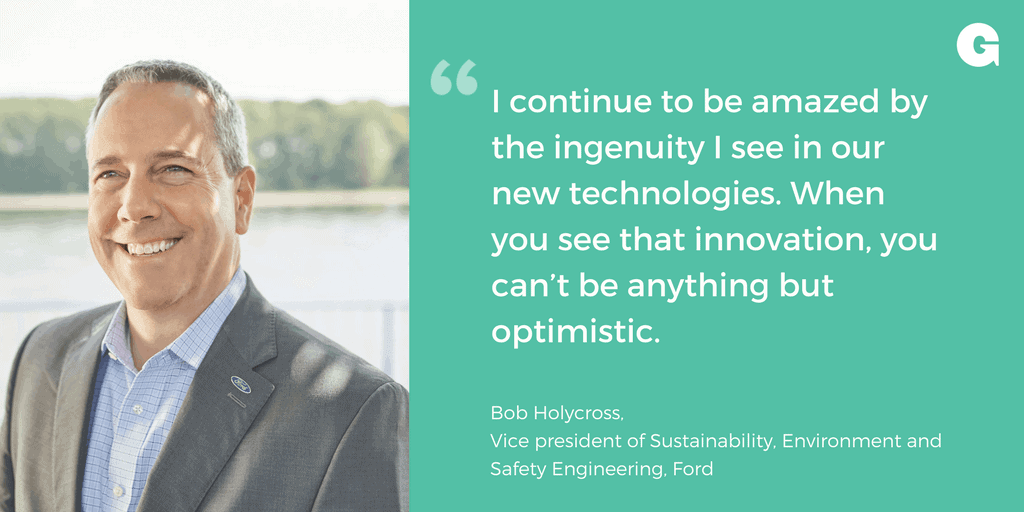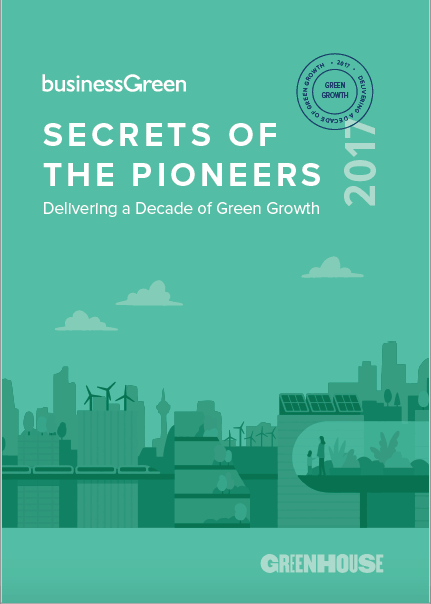Secrets of the Pioneers: Bob Holycross

We speak to Bob Holycross, vice president of Sustainability, Environment and Safety Engineering for Ford in Europe, Middle East and Africa.
The interview is part of a series for a report, Secrets of Pioneers, Delivering a Decade of Green Growth, which was launched at the BusinessGreen Leaders’ Summit on 9th November 2017.
Bob is responsible for the development and implementation of the company’s environment and safety strategy, policy and performance in Europe. Previously, he was director of Global Certification and Program Compliance for Ford’s Sustainability, Environment and Safety Engineering organisation.
Where were you in 2007?
For Ford and the industry, we were just getting in to the global financial crisis. We were on the cusp of our global transformation programme. It was very different to the transformation we are going through today; we were really on the cusp of figuring out how to survive.
At the same time, sustainability wasn’t a new thing for us even in 2007. We have been doing formal sustainability reporting as far back as 2000 and given our heritage and legacy sustainability has always played a prominent role in the company in one form or another.
Where would you expect to be in 2027?
If you look 10 years from now, we would see ourselves very much on the leading edge of being an automobile and mobility company. And by that time the broader industry might even be described in terms of the overall mobility operating system.
For us, our goal over the next five or 10 years is to be front and centre in that discussion. The real thing for us is how we continuously innovate to deliver all the products that can make that work.
By 2027 we will see a lot more products that are electrified, we should see smarter vehicles, vehicles that are connected to the cloud and each other. With the work we are already doing in that space, the goal would be to have all those technologies penetrate as much of the way through the fleet as possible.
What has been the biggest lesson you have learnt as a sustainability executive over the past 10 years?
That’s a really important question, lessons learnt are always important. For us and Ford, and even for me personally, recognising the importance of integrity in the process has been an important lesson. It is not just about the products and services you produce and offer, but the manner in how you do it.
Integrity matters and we have seen in our industry where that has been challenged. I think that can be a big wake up call for some, that if you don’t do it the right way some of the metrics may improve, but that really won’t make a difference if people aren’t buying your products because you are not doing it with the right level of integrity.

What do we need to do to deliver on the vision of a cleaner, smarter fleet over the next decade?
Innovation has to be there by default. Beyond that it is a question of how do we connect the right government policies globally, given the societal concerns around air quality and congestion.
The toughest thing we have seen with electrification has been the difficulty of matching the ambitions of regulatory targets with customer demand. In some cases, we have had experience with technology mandates where we recognise what the goals are and where we need to get to, but if we have policies that are too short-sighted or too tech-specific the risk is we bring in technologies too early that don’t resonate with customers. Then the brand of those technologies is damaged even if you then make progress.
This isn’t about resisting increasing the pace of electrification, it is trying to do it in a manner that considers all the broader requirements and use cases.
One example for us is, as we are making investments in products for 2020 and beyond, we have to look at investments that will be required in infrastructure to charge vehicles. We have entered into a partnership with a number of companies in Germany to look at the high-speed charging network on motorways. We are going to have to work with others in the industry and policymakers to make all of this work.
Do you think we will be on track to keep temperature increases below 2C by 2027?
I like to think we’ll be on course. But whether or not we are on track is not going to change what we try to do. We will be working to continue to improve fleet efficiency and electrification year over year. In addition to regulatory targets we also set our targets complimentary to 2C or the 450ppm stabilisation concentration.
If you could invest in one clean technology through to 2027 what would it be?
That’s a tough one, as there’s no silver bullet and I know this will be the expected answer. But when I look at it I think about vehicle connectivity. The ability of vehicles to connect with one another and with the transport infrastructure – the investment in that technology is really going to be the foundation for everything else. To get at these issues like congestion and ride services and the underlying mobility operating system, that connectivity will be key.
It’s not as simple as putting a modem in the car, there are considerations for cyber security and privacy and how vehicles react on the fly. It is a very complex web of innovation we will have to work through, but I consider that to be a key enabler for clean technology.
What advice would you give to a sustainability executive starting their career today?
The one thing for me has been the need to embed yourself in the operations of the company. You can’t think of sustainability as what you do after the product has been designed or manufactured. There isn’t some sustainability widget you bolt on at the end, you have to integrate it throughout the product design cycle and the operations. That has been the most exciting part of my role.
The other thing is you need to keep an open and curious mind. The pace of change is phenomenal and you have to stay curious to be effective.
Are you optimistic or pessimistic when it comes to the next decade?
I am absolutely an optimist. When you are going through a big transformation and there is that level of uncertainty you can be pessimistic or scared to take the leap. But I am optimistic because we have the best people in the industry, we have the financial foundation, and we have the leadership.
I am an engineer by training and I still continue to be amazed with the ingenuity I see with some of the new technologies our engineers are coming up with. When you see that innovation, you can’t be anything but optimistic.

This interview is one of more than 20 which make up a report, Secrets of the Pioneers: Delivering a Decade of Green Growth, published on 9th November at the BusinessGreen Leaders’ Summit.
We have already featured interviews with many other leaders from the sector, including Christiana Figueres, former executive secretary of the United Nations Framework Convention on Climate Change, Mike Barry, director of sustainable business at Marks & Spencer, and climate scientist Dr Emily Shuckburgh. These interviews and many others are available on the blog.
This year marks the 10th anniversary of both BusinessGreen and Greenhouse PR, the specialist communications agency which supports businesses, entrepreneurs and campaigners working to create a green economy.
At Greenhouse, we support a wide variety of organisations pioneering new standards of sustainability across multiple sectors. Whether it’s fashion, finance or farming, we’re always on the look-out for new opportunities to reach our clients’ target audiences. If you’ve got a great story and need our help to tell it, we’d love to hear from you.


